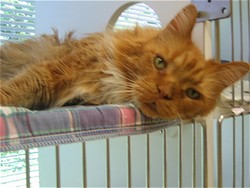
We use Boehringer Ingelheim vaccines for vaccines that offer a small volume {1/2 ml}, pure vaccine for our pets. SFAH vaccines are also 100% guarenteed by this company to prevent disease processes in our pets.
We see virtually no "true" reaction to our vaccines. Expected adverse reaction [s] for any vaccine[s] can be lethargy, anorexia, and/or fever for up to 72 hours.
All cats must be risk assessed for their vaccination [s] needs. Indoor cats are at risk for serious diseases, and must be vaccinated .
Sarcomas that where first thought to be vaccination induced, are now known to be genetic and trauma based.
Rabies
 Rabies is required by Tennessee and enforced by Williamson County Animal Control. Williamson County is still seen as a very high risk county for rabies due to our wildlife. Even indoor cats need yearly rabies vaccine. No reason not to prevent disease and zoonotic risk and complications.
Rabies is required by Tennessee and enforced by Williamson County Animal Control. Williamson County is still seen as a very high risk county for rabies due to our wildlife. Even indoor cats need yearly rabies vaccine. No reason not to prevent disease and zoonotic risk and complications.
Panleukopenia Virus
The more common name for this virus is “distemper”. It is a highly contagious disease which is why vaccination is recommended. Symptoms include fever, seizures, loss of appetite, and possibly death. Kittens are born with a natural immunity for the first few weeks of their lives. Vaccinations are a must in a timely series of 3 to 4 boosters. Your cat should get this vaccine yearly.
Rhinotracheitis
Caused by the herpes virus, Rhinotracheitis is an upper respiratory infection that is highly contagious. The infection could prove to be fatal in young kittens, and chronic in adults. Kittens must be boostered in a series of 3 to 4 boosters, and yearly.
Calicivirus
Calicivirus is a virus that causes an upper respiratory infection. It is very contagious through contact with infected cats. Symptoms include fever, gum disease, mouth ulcers, sneezing, among others. More advanced forms of the virus are more severe and can cause fatality. Cats do not need to exhibit symptoms in order to transmit the disease to other cats. The contagious nature of this disease makes it important for your cat to receive a vaccination.
Chlamydiosis
This disease is much more prevalent in cats that live in a multiple cat environment. The most obvious symptom is usually conjunctivitis, and the disease is carried in the eye discharge of infected cats.
Feline Leukemia Virus
This is another virus that is spread through direct contact with an infected cat. For this reason the vaccine is highly recommended for outdoor cats, or cats that are frequently in contact with other cats. Indoor, solitary cats should still be vaccinated to prevent against the potentially fatal virus, but are not at as high a risk to contract it. FELV should be administered to ALL cats in a two series vaccine 3 to 6 weeks apart as a kitten, then annually for first year minimum. Outdoor cats, require testing yearly and vaccinated yearly.
